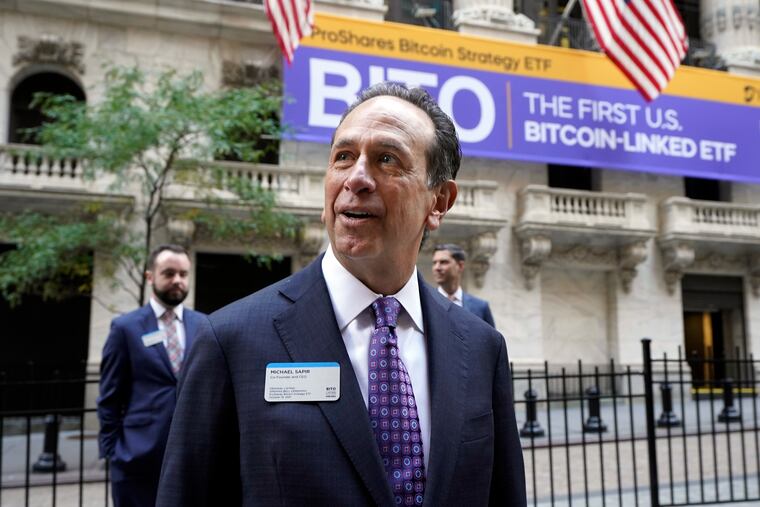Bitcoin-based fund’s expected launch will make it easier for investors to buy a stake in crypto
The cryptocurrency, which has more than doubled in price this year while operating on the fringes of financial markets, is expected to take a big step toward joining the investing establishment.

Bitcoin, the cryptocurrency that has more than doubled in price this year while operating largely on the fringes of financial markets, took a big step Tuesday toward joining the investing establishment.
With the debut of ProShares Bitcoin Strategy ETF, everyday investors with brokerage accounts are able to buy a stake in the world’s largest cryptocurrency through a fund that tracks its future price.
ProShares Bitcoin Strategy ETF is the first of its kind to trade on a U.S. stock exchange, after winning the tacit approval of the Securities and Exchange Commission. Bitcoin investors and other crypto-industry advocates are calling the development a watershed, heralding what they hope will be wider acceptance of digital assets by regulators.
“It is a significant milestone for both ETFs and for cryptocurrency,” said Michael Sapir, CEO of Bethesda, Md.-based ProShares, the asset manager launching the fund. “This is a convenient, familiar, liquid way to access the asset class. ... The bitcoin market and the regulation of bitcoin is evolving.”
The ProShares Bitcoin Strategy ETF invests in futures contracts for Bitcoin rather than the currency itself. The fund (BITO) finished its first trading day at $41.94, up 4.9%.
The Associated Press reported that the price of bitcoin rose 4.5% on Tuesday, according to CoinDesk, and is now about 1.2% below its all-time high of $64,888.99 per coin.
SEC Chair Gary Gensler has issued some strong critiques of the crypto industry since taking the reins at the markets regulator six months ago, calling the sector a haven for scammers while offering limited value for consumers.
But in an August speech, Gensler signaled that he would approve applications for certain exchange-traded funds tracking crypto assets. He reasoned that the SEC could safely oversee such funds, since they fall under an existing securities law that “provides significant investor protections.”
Because the funds allow investors to bet on gains in the future price of bitcoin, without buying the underlying asset itself, and because the SEC regulates the exchanges that the futures contracts trade on, regulators should have greater insight into their pricing, which crypto critics say remains open to manipulation on unregulated exchanges.
Gensler's comments seemed to break a decade-old dam of SEC resistance to approving bitcoin futures ETFs. Asset managers have moved swiftly to capitalize on the agency's new stance: A handful of other funds are expected to list their own futures-based bitcoin ETFs in the days ahead, with more to come after that. The SEC declined to comment.
Groups that argue for tougher oversight of the financial industry, typically fans of Gensler's approach, are criticizing his decision on the grounds that bitcoin remains highly volatile. "It's a strange move," said Phillip Basil, director of banking policy for Better Markets. "Just by adding more layers on top of a shaky foundation, you're all of a sudden saying you feel more comfortable about the whole thing."
Leading players in the industry believe the SEC's decision to allow these funds will lead to approvals of different kinds of crypto-focused investment vehicles.
Grayscale Investments — which operates what it calls the world’s largest bitcoin trust, with more than $30 billion in assets — already is applying to convert the trust into an exchange-traded fund tracking bitcoin’s spot price.
Grayscale's Craig Salm said a new comfort level with the bitcoin market among regulators prompted the company to resubmit an application it first filed nearly four years ago. "We've had a very proactive and robust dialog with the commission over these years," Salm said.
Estimates of the investor demand for the bitcoin funds vary. Fundstrat Global Advisors, a research firm, projects it could see $36 billion in investment in its first year, exceeding the performance of the most successful such fund launched to date, a Nasdaq ETF that tracks tech stocks.
"If we stopped today and all we had from here on out was a futures-based ETF for bitcoin, everybody in the crypto industry would be disappointed in that," said Sean Farrell, Fundstrat's head of digital strategy. "However I think you need to be somewhat optimistic that this is a good sign for crypto."
Elsewhere, regulators are eyeing ways to bring the sector under stricter scrutiny and cracking down on dodgy actors. A group of top officials overseeing financial markets is preparing a report, coordinated by the Treasury Department, that will propose new rules for stablecoins, digital tokens pegged to the dollar that have exploded in popularity. The Financial Stability Oversight Council, a committee established after the 2008 financial crisis to evaluate systemic threats, is set to discuss the matter this week.
On Friday, the Commodity Futures Trading Commission reached a settlement with Tether, the biggest stablecoin issuer, over charges that the company lied for years about holding a dollar in reserve for each of its tokens. Tether agreed to pay $41 million.
On Monday, New York Attorney General Letitia James announced that she sent cease-and-desist letters to two unregistered crypto exchanges, demanding they stop operating in the state.